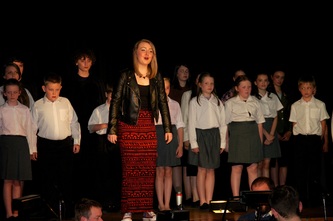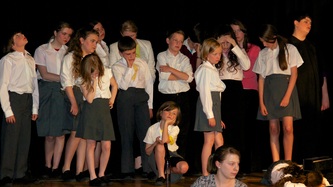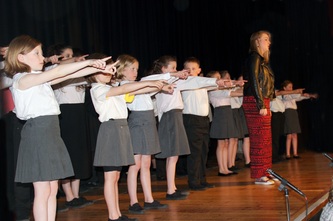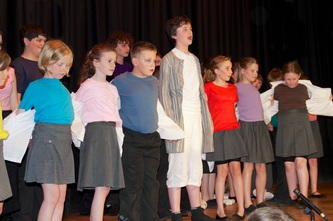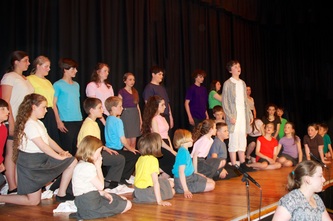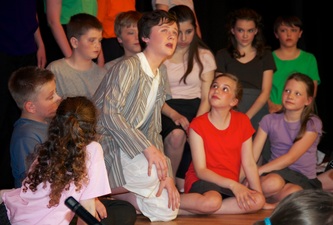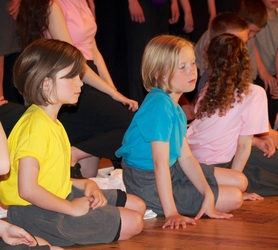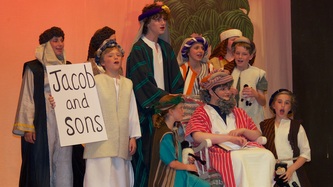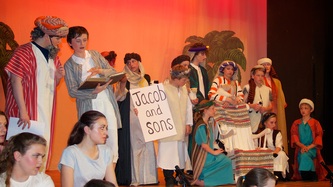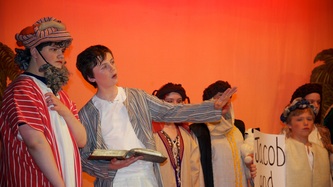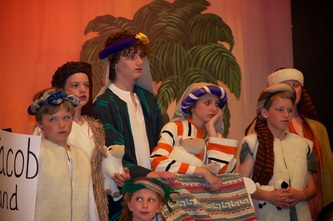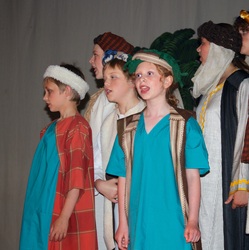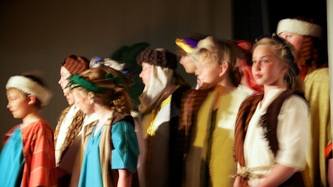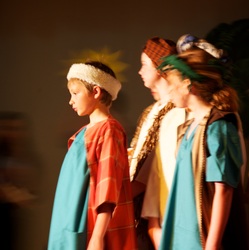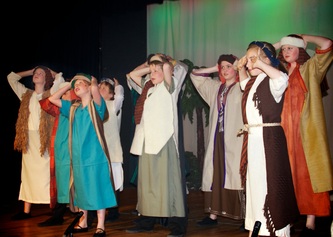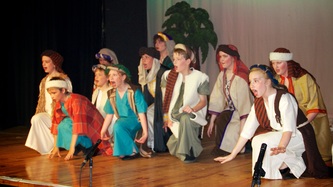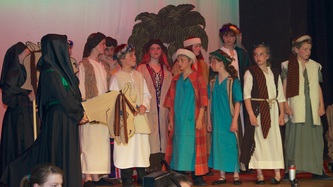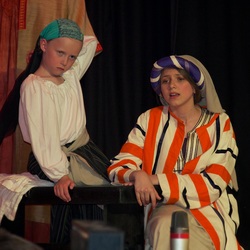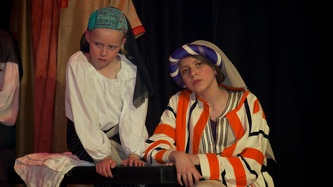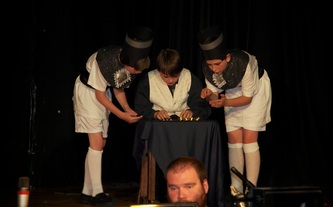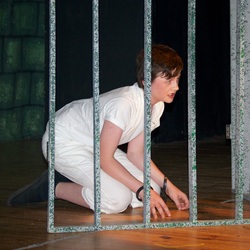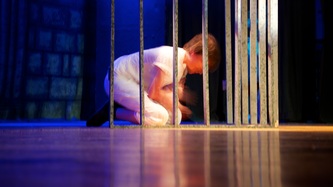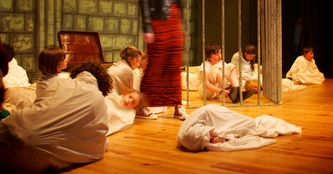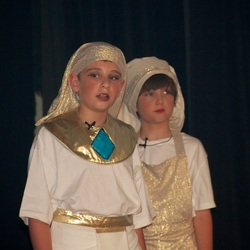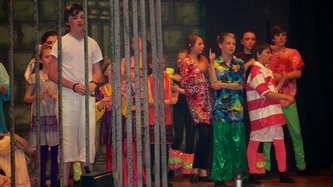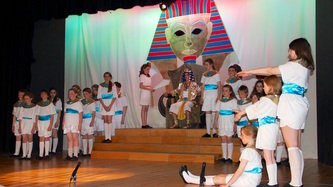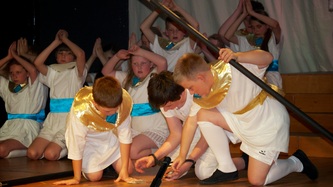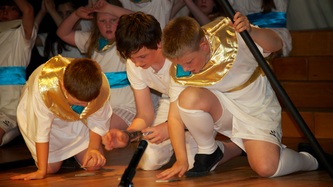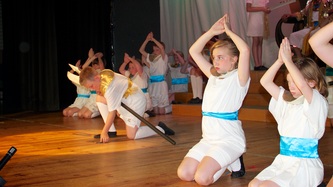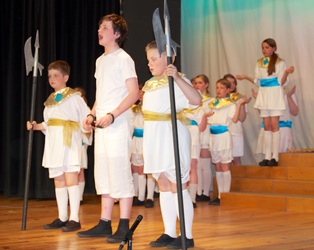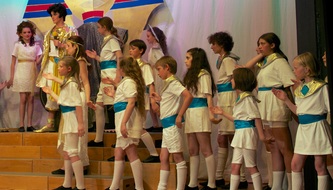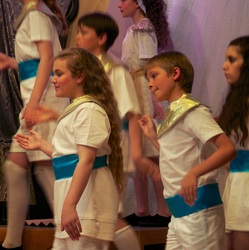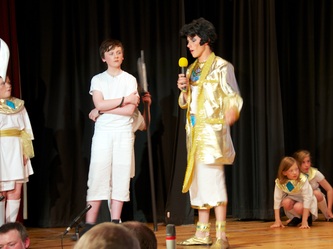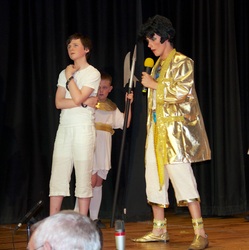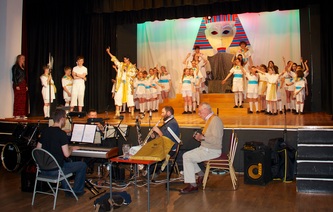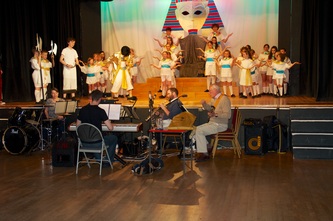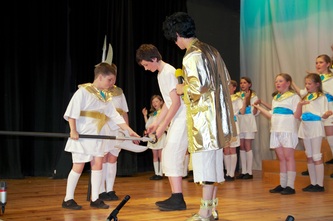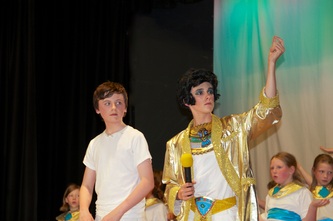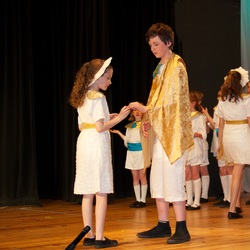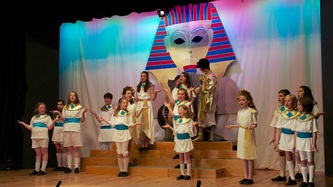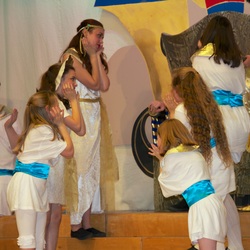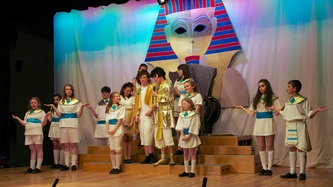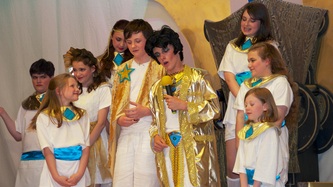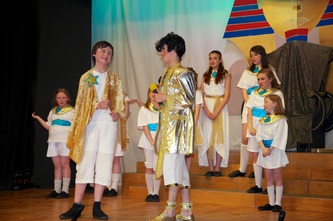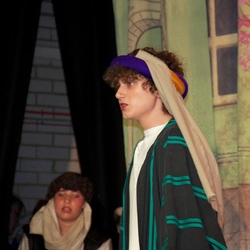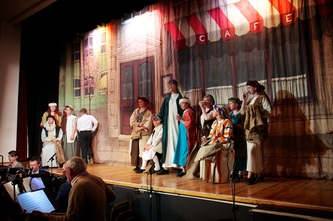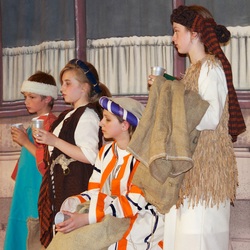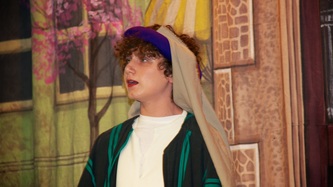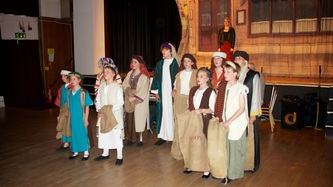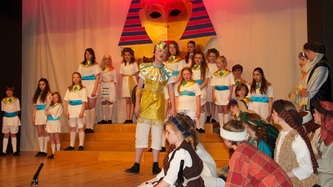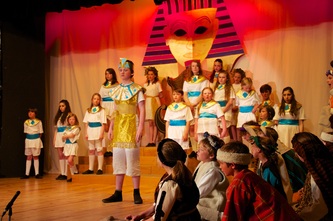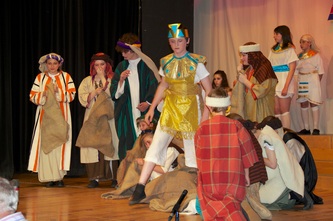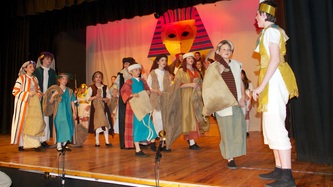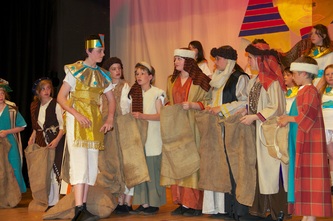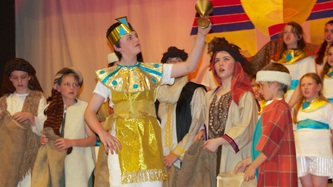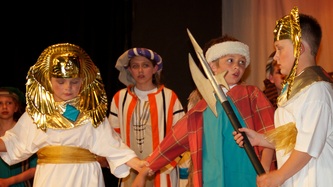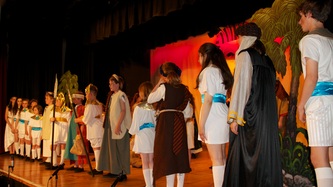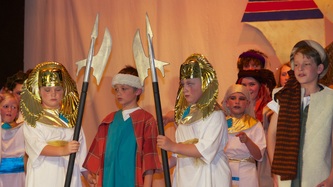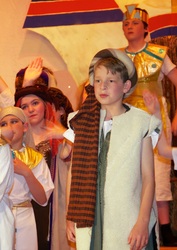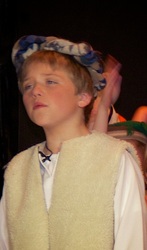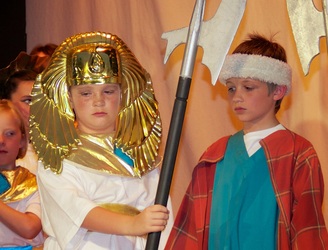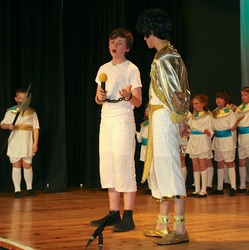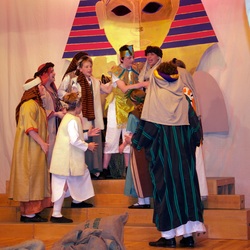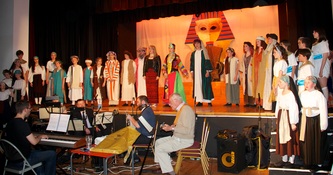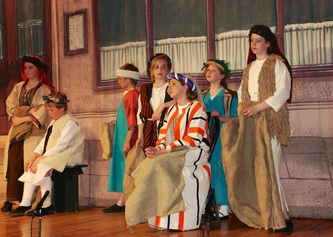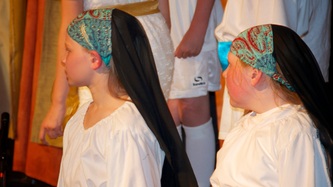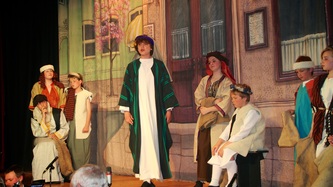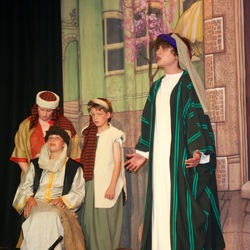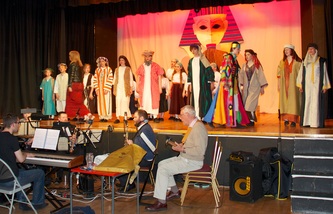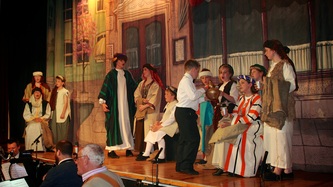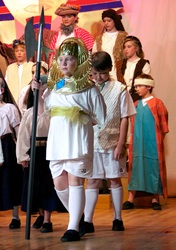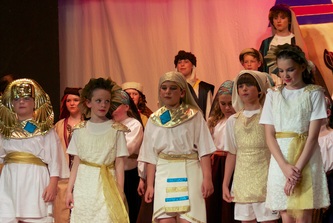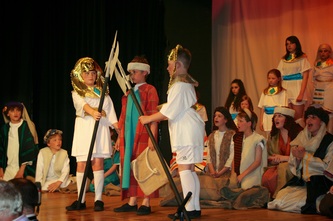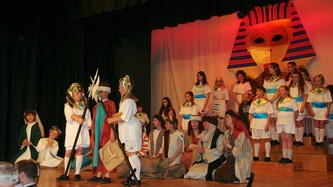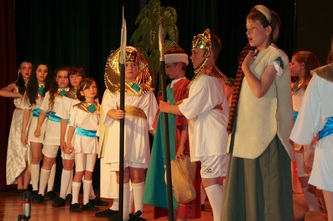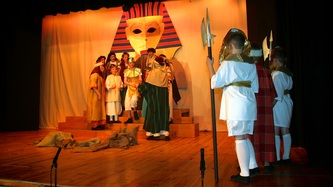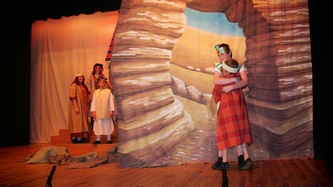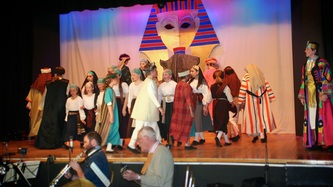Joseph and the Amazing Technicolour Dreamcoat
28 June to 30 June 2013

The story is based on the Biblical story of Joseph, found in the Book of Genesis. It is set in a frame in which a narrator is telling a story (sometimes to children, encouraging them to dream). She then tells the story of Joseph, another dreamer ("Prologue," "Any Dream Will Do"). In the beginning of the main story Jacob and his 12 sons are introduced ("Jacob and Sons"). Joseph's brothers are jealous of him for his coat of many colours, a symbol of their father's preference for him ("Joseph's Coat"). It is clear from Joseph's dreams that he is destined to rule over them ("Joseph's Dreams"). To get rid of him and prevent the dreams from coming true, they attempt fratricide, but then they sell Joseph as a slave to some passing Ishmaelites ("Poor, Poor Joseph"), who take him to Egypt, and the rest is history.
A Review of this Show by Stewart Adkins (NODA)
Director - Emma Jane Sweeney, Musical Director - Ian Southgate
Joseph is a great choice of show for young children, giving them plenty of stage time, with songs and simple choreography, as well as the opportunity to learn about costume changes, properly timed entrances and exits and the need to adopt different characters, depending on their role. The music is great and the variety of musical styles provides plenty of challenge. With only four biggish solo roles Joseph can be done with a limited number of singers and plenty of chorus or choir. In this production the orchestration was for a five piece band, which sounded great. The trumpet and woodwind really added something which would not have been so easily accomplished using keyboard alone. The compromise here was that the singing could not always be heard over the band.
Despite this the production went well, with Rebecca Craythorne as the Narrator reaching the high notes, literally and metaphorically, to keep the story moving; Grant Clark was a vulnerable and appealing Joseph, especially during his fun scene wrestling with Potiphar’s wife (gamely played by Jessica Culverwell) on the chaise; Ralph Stevens brought Elvis to life as the Pharaoh and Alexander Bloom brought some joie de vivre to Reuben’s song, Those Canaan Days. The costumes were all impressive and hats off to the wardrobe team for a logistical exercise that would keep Potiphar’s slaves busy. The props made a big impact on helping the story unfold; with no dialogue it isn’t always easy to follow what is happening. The set also was good, particularly Pharaoh’s throne and the French Cafe cloth for Reuben’s song.
The young chorus, often split into different roles, coped very well with a very busy show and looked convincing Israelites, Ishmalites and Egyptian slaves, guards and palace servants. The audience was enthusiastic, the house looked full and I won a raffle prize. Congratulations to all.
Reviewer - Stewart Adkins
Regional Representative, District 8, NODA East
A Review of this Show by Stewart Adkins (NODA)
Director - Emma Jane Sweeney, Musical Director - Ian Southgate
Joseph is a great choice of show for young children, giving them plenty of stage time, with songs and simple choreography, as well as the opportunity to learn about costume changes, properly timed entrances and exits and the need to adopt different characters, depending on their role. The music is great and the variety of musical styles provides plenty of challenge. With only four biggish solo roles Joseph can be done with a limited number of singers and plenty of chorus or choir. In this production the orchestration was for a five piece band, which sounded great. The trumpet and woodwind really added something which would not have been so easily accomplished using keyboard alone. The compromise here was that the singing could not always be heard over the band.
Despite this the production went well, with Rebecca Craythorne as the Narrator reaching the high notes, literally and metaphorically, to keep the story moving; Grant Clark was a vulnerable and appealing Joseph, especially during his fun scene wrestling with Potiphar’s wife (gamely played by Jessica Culverwell) on the chaise; Ralph Stevens brought Elvis to life as the Pharaoh and Alexander Bloom brought some joie de vivre to Reuben’s song, Those Canaan Days. The costumes were all impressive and hats off to the wardrobe team for a logistical exercise that would keep Potiphar’s slaves busy. The props made a big impact on helping the story unfold; with no dialogue it isn’t always easy to follow what is happening. The set also was good, particularly Pharaoh’s throne and the French Cafe cloth for Reuben’s song.
The young chorus, often split into different roles, coped very well with a very busy show and looked convincing Israelites, Ishmalites and Egyptian slaves, guards and palace servants. The audience was enthusiastic, the house looked full and I won a raffle prize. Congratulations to all.
Reviewer - Stewart Adkins
Regional Representative, District 8, NODA East
These photos were taken at our dress rehearsal on 27 June 2013.
The musical’s variety of styles, in both music and dance, demands a versatile and flexible cast, and we did not disappoint.
Take a look at these photos to see us rehearse this wonderful production.
The musical’s variety of styles, in both music and dance, demands a versatile and flexible cast, and we did not disappoint.
Take a look at these photos to see us rehearse this wonderful production.
SHOW SYNOPSIS
The story is based on the Biblical story of Joseph, found in the Book of Genesis. It is set in a frame in which a narrator is telling a story (sometimes to children, encouraging them to dream). She then tells the story of Joseph, another dreamer ("Prologue," "Any Dream Will Do"). In the beginning of the main story Jacob and his 12 sons are introduced ("Jacob and Sons"). Joseph's brothers are jealous of him for his coat of many colours, a symbol of their father's preference for him ("Joseph's Coat"). It is clear from Joseph's dreams that he is destined to rule over them ("Joseph's Dreams"). To get rid of him and prevent the dreams from coming true, they attempt fratricide, but then they sell Joseph as a slave to some passing Ishmaelites ("Poor, Poor Joseph"), who take him to Egypt.
Back home, his brothers, led by Reuben and accompanied by their wives, break the news to Jacob that Joseph has been killed. They show his tattered coat smeared with his blood – really goat blood – as proof that what they say is true ("One More Angel in Heaven"). After the bereft Jacob leaves, the brothers and their wives happily celebrate the loss of Joseph.
In Egypt, Joseph is the slave of Egyptian millionaire Potiphar. He rises through the ranks of slaves and servants until he is running Potiphar's house. When Mrs. Potiphar makes advances, Joseph spurns her. She removes his shirt, feels his chest and back, squeezes his rear and blows him kisses. Potiphar overhears, barges in, sees the two together – and jumps to conclusions ("Potiphar"). Outraged, he throws Joseph in jail. Depressed, Joseph laments the situation ("Close Every Door") – but his spirits rise when he helps two prisoners put in his cell. Both are former servants of the Pharaoh and both have had bizarre dreams. Joseph interprets them. One cellmate, the Baker, will be executed, but the other, the Butler, will be returned to service. Upon hearing this, the rest of the prisoners surround Joseph and encourage him to go after his dreams ("Go, Go, Go Joseph").
The Narrator tells of impending changes in Joseph's fortunes ("A Pharaoh Story") because the Pharaoh is having dreams that no-one can interpret. Now freed, the Butler tells Pharaoh (acted in the style of Elvis Presley) of Joseph and his dream interpretation skills ("Poor, Poor Pharaoh"). Pharaoh orders Joseph to be brought in and the king tells him his dream involving seven fat cows, seven skinny cows, seven healthy ears of corn, and seven dead ears of corn ("Song of the King"). Joseph interprets the dream as seven plentiful years of crops followed by seven years of famine ("Pharaoh's Dreams Explained"). An astonished Pharaoh puts Joseph in charge of carrying out the preparations needed to endure the impending famine, and Joseph becomes the most powerful man in Egypt, second only to the Pharaoh ("Stone the Crows").
Back home, the famine has caught up with Joseph's brothers, who – led by the brother Simeon – express regret at selling him and deceiving their father ("Those Canaan Days"). They hear Egypt still has food and decide to go there to beg for mercy and to be fed, not realising that they will be dealing with Joseph ("The Brothers Come to Egypt"). He gives them sacksful of food and sends them on their way, but plants a golden cup in the sack of his youngest brother, Benjamin ("Grovel, Grovel"). When the brothers try to leave, Joseph stops them, asking about the "stolen cup". Each brother empties his sack, and it is revealed that Benjamin has the cup. Joseph then accuses Benjamin of robbery ("Who's the Thief?"). The other brothers, led by Judah, beg for mercy for Benjamin, imploring that Joseph take them prisoner and set Benjamin free ("Benjamin Calypso").
Seeing their selflessness and penitence, Joseph reveals himself ("Joseph All the Time") and sends for his father. The two are reunited ("Jacob in Egypt") for a happy conclusion and Joseph dons his coloured coat once more ("Finale: Any Dream Will Do (Reprise)/Give Me My Coloured Coat").
The story is based on the Biblical story of Joseph, found in the Book of Genesis. It is set in a frame in which a narrator is telling a story (sometimes to children, encouraging them to dream). She then tells the story of Joseph, another dreamer ("Prologue," "Any Dream Will Do"). In the beginning of the main story Jacob and his 12 sons are introduced ("Jacob and Sons"). Joseph's brothers are jealous of him for his coat of many colours, a symbol of their father's preference for him ("Joseph's Coat"). It is clear from Joseph's dreams that he is destined to rule over them ("Joseph's Dreams"). To get rid of him and prevent the dreams from coming true, they attempt fratricide, but then they sell Joseph as a slave to some passing Ishmaelites ("Poor, Poor Joseph"), who take him to Egypt.
Back home, his brothers, led by Reuben and accompanied by their wives, break the news to Jacob that Joseph has been killed. They show his tattered coat smeared with his blood – really goat blood – as proof that what they say is true ("One More Angel in Heaven"). After the bereft Jacob leaves, the brothers and their wives happily celebrate the loss of Joseph.
In Egypt, Joseph is the slave of Egyptian millionaire Potiphar. He rises through the ranks of slaves and servants until he is running Potiphar's house. When Mrs. Potiphar makes advances, Joseph spurns her. She removes his shirt, feels his chest and back, squeezes his rear and blows him kisses. Potiphar overhears, barges in, sees the two together – and jumps to conclusions ("Potiphar"). Outraged, he throws Joseph in jail. Depressed, Joseph laments the situation ("Close Every Door") – but his spirits rise when he helps two prisoners put in his cell. Both are former servants of the Pharaoh and both have had bizarre dreams. Joseph interprets them. One cellmate, the Baker, will be executed, but the other, the Butler, will be returned to service. Upon hearing this, the rest of the prisoners surround Joseph and encourage him to go after his dreams ("Go, Go, Go Joseph").
The Narrator tells of impending changes in Joseph's fortunes ("A Pharaoh Story") because the Pharaoh is having dreams that no-one can interpret. Now freed, the Butler tells Pharaoh (acted in the style of Elvis Presley) of Joseph and his dream interpretation skills ("Poor, Poor Pharaoh"). Pharaoh orders Joseph to be brought in and the king tells him his dream involving seven fat cows, seven skinny cows, seven healthy ears of corn, and seven dead ears of corn ("Song of the King"). Joseph interprets the dream as seven plentiful years of crops followed by seven years of famine ("Pharaoh's Dreams Explained"). An astonished Pharaoh puts Joseph in charge of carrying out the preparations needed to endure the impending famine, and Joseph becomes the most powerful man in Egypt, second only to the Pharaoh ("Stone the Crows").
Back home, the famine has caught up with Joseph's brothers, who – led by the brother Simeon – express regret at selling him and deceiving their father ("Those Canaan Days"). They hear Egypt still has food and decide to go there to beg for mercy and to be fed, not realising that they will be dealing with Joseph ("The Brothers Come to Egypt"). He gives them sacksful of food and sends them on their way, but plants a golden cup in the sack of his youngest brother, Benjamin ("Grovel, Grovel"). When the brothers try to leave, Joseph stops them, asking about the "stolen cup". Each brother empties his sack, and it is revealed that Benjamin has the cup. Joseph then accuses Benjamin of robbery ("Who's the Thief?"). The other brothers, led by Judah, beg for mercy for Benjamin, imploring that Joseph take them prisoner and set Benjamin free ("Benjamin Calypso").
Seeing their selflessness and penitence, Joseph reveals himself ("Joseph All the Time") and sends for his father. The two are reunited ("Jacob in Egypt") for a happy conclusion and Joseph dons his coloured coat once more ("Finale: Any Dream Will Do (Reprise)/Give Me My Coloured Coat").






